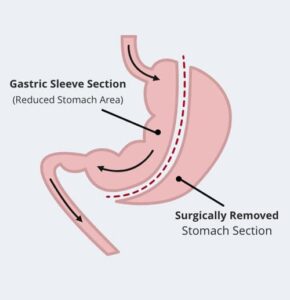
Gastric sleeve surgery, also known as sleeve gastrectomy, is a popular weight loss procedure that involves removing a portion of the stomach to reduce its size. This surgery can be an effective treatment for obesity and related health conditions. Many people consider undergoing this procedure in Turkey due to its high-quality medical services and relatively lower costs. Here’s what you need to know about the cost and other important aspects of gastric sleeve surgery in Turkey:
Cost of Gastric Sleeve Surgery in Turkey
Gastric sleeve Turkey cost can vary depending on several factors, including the hospital, the surgeon’s expertise, and the specifics of the medical package offered. On average, the cost ranges from $3,000 to $6,000. This is significantly lower than in many Western countries, where the procedure can cost upwards of $15,000 to $20,000.
Factors Affecting the Cost
- Hospital and Facilities: High-end hospitals with advanced facilities may charge more.
- Surgeon’s Experience: Surgeons with extensive experience and a high success rate may have higher fees.
- Included Services: Some packages include pre-operative tests, post-operative care, accommodation, and transportation, which can affect the total cost.
- Geographical Location: Costs may vary slightly depending on the city or region in Turkey.
Why Choose Turkey?
- High-Quality Medical Care: Turkey is known for its high standards in medical care and state-of-the-art facilities.
- Experienced Surgeons: Many Turkish surgeons have international training and are highly experienced in bariatric surgeries.
- Cost-Effective: The overall cost, including travel and accommodation, can be much lower than in many other countries.
- Comprehensive Packages: Many hospitals offer all-inclusive packages that cover surgery, hospital stay, post-operative care, and even tourism opportunities.
What’s Included in the Cost?
- Pre-Operative Tests: Blood tests, imaging, and other necessary diagnostics.
- Surgery: The actual procedure, including anesthesia and surgical fees.
- Hospital Stay: Typically, a 2-3 day hospital stay for recovery.
- Post-Operative Care: Follow-up consultations and care instructions.
- Additional Services: Some packages include airport transfers, hotel accommodation, and even a personal assistant.
Things to Consider
- Research: Thoroughly research
the hospitals and surgeons you are considering. Look for reviews, success rates, and any certifications or accreditations.
2. Consultation: Have an initial consultation, which can often be done virtually, to discuss your medical history, expectations, and any concerns you might have.
3. Travel Arrangements: Plan your travel and accommodation in advance. Some packages may include these, but if not, ensure you have a comfortable place to stay during your recovery period.
4. Post-Operative Care: Understand the post-operative care requirements and ensure you have access to necessary medical support once you return home.
5. Insurance: Check if your health insurance covers any part of the procedure, even if done abroad. Some international insurance plans might offer partial coverage.
6. Legal and Safety Considerations: Ensure that the hospital adheres to international medical standards and that you are aware of your rights as a patient.
Benefits of Gastric Sleeve Surgery
- Weight Loss: Significant and sustained weight loss, which can lead to improved overall health.
- Improved Health Conditions: Reduction or resolution of obesity-related conditions such as type 2 diabetes, hypertension, and sleep apnea.
- Enhanced Quality of Life: Improved mobility, energy levels, and self-esteem.
Risks and Complications
As with any surgical procedure, gastric sleeve surgery carries certain risks, including:
- Infection: Post-surgical infections can occur, though they are relatively rare.
- Bleeding: There is a risk of bleeding during or after the surgery.
- Nutritional Deficiencies: Reduced stomach size can lead to deficiencies in vitamins and minerals, requiring lifelong supplements.
- Gastroesophageal Reflux Disease (GERD): Some patients may develop GERD after the surgery.
- Surgical Complications: There is always a risk of complications related to anesthesia and the surgical procedure itself.
Preparing for Surgery
- Medical Evaluation: Undergo a thorough medical evaluation to ensure you are a suitable candidate for the surgery.
- Dietary Changes: Follow any pre-operative dietary guidelines provided by your healthcare provider.
- Quit Smoking: If you smoke, quitting is essential as smoking can interfere with healing and increase the risk of complications.
- Mental Preparation: Understand the lifestyle changes required post-surgery and ensure you are mentally prepared to adhere to them. Psychological support or counseling might be beneficial to help you adjust to the changes.
Post-Surgery Care and Lifestyle Changes
- Dietary Adjustments: Post-surgery, you will need to follow a specific diet, starting with liquids and gradually progressing to solid foods. Portion control and nutritional balance are crucial.
- Regular Exercise: Incorporate regular physical activity into your routine to maximize weight loss and improve overall health.
- Follow-Up Appointments: Attend all scheduled follow-up appointments to monitor your progress and address any concerns.
- Supplements: Take prescribed vitamin and mineral supplements to prevent deficiencies due to reduced food intake.
- Hydration: Drink plenty of water to stay hydrated, but avoid drinking large amounts at once.
- Support System: Engage with support groups or counseling services to help you stay motivated and manage any emotional challenges.

Choosing the Right Hospital and Surgeon
- Accreditation: Ensure the hospital is accredited by recognized international health organizations.
- Surgeon’s Credentials: Verify the surgeon’s qualifications, experience, and success rates with gastric sleeve surgeries.
- Patient Reviews: Read testimonials and reviews from previous patients to gauge their experiences and satisfaction levels.
- Facility Tour: If possible, visit the hospital to assess the cleanliness, facilities, and overall environment.
- Communication: Ensure that the medical staff speaks your language or that translation services are available to facilitate clear communication.
Commonly Asked Questions
- How long is the recovery period?
- Most patients can return to normal activities within 4-6 weeks, but full recovery may take a few months.
- Will I need plastic surgery after weight loss?
- Some patients opt for plastic surgery to remove excess skin after significant weight loss, but this is a personal choice.
- Can I regain weight after surgery?
- While the surgery helps with weight loss, maintaining a healthy lifestyle is crucial to prevent weight regain.
- Is the procedure reversible?
- Gastric sleeve surgery is generally considered irreversible, as a portion of the stomach is permanently removed.
Final Tips
- Documentation: Keep all medical documents, including pre-op evaluations, surgical reports, and post-op care instructions.
- Emergency Plan: Have a plan in place in case you experience complications after returning home. Know the nearest medical facilities that can provide follow-up care.
- Stay Informed: Continuously educate yourself about the lifestyle changes needed to maintain your weight loss and improve your overall health.
- Support Network: Build a support network of family, friends, and healthcare professionals to help you through the journey.
By taking these steps, you can make an informed decision about undergoing gastric sleeve surgery in Turkey and embark on a path toward a healthier, more fulfilling life.
Final Words
Undergoing gastric sleeve surgery is a significant decision that can have life-changing benefits. Turkey offers a compelling option for those seeking high-quality, affordable medical care. By thoroughly researching your options, preparing adequately, and adhering to post-operative guidelines, you can achieve successful weight loss and improve your overall health.
Remember, the journey doesn’t end with the surgery. Maintaining a healthy lifestyle, staying committed to dietary and exercise routines, and regularly consulting with healthcare professionals are crucial for long-term success. With the right support and determination, you can achieve your weight loss goals and enjoy a healthier, more active life.
If you have any more questions or need further assistance, feel free to reach out to healthcare professionals or support groups. Good luck on your journey to better health!
Long-Term Success and Maintenance
Achieving long-term success after gastric sleeve surgery requires a commitment to ongoing lifestyle changes and regular medical follow-ups. Here are some key strategies to help you maintain your weight loss and overall health:
- Regular Medical Check-Ups:
- Schedule regular follow-up appointments with your bariatric surgeon or primary care physician to monitor your progress, nutritional status, and overall health.
- Blood tests may be required periodically to check for vitamin and mineral deficiencies.
- Nutritional Guidance:
- Work with a dietitian or nutritionist who specializes in bariatric surgery to develop a balanced meal plan that meets your nutritional needs.
- Focus on high-protein, low-carbohydrate foods, and avoid high-sugar and high-fat foods.
- Portion Control:
- Use smaller plates and utensils to help control portion sizes.
- Eat slowly and chew thoroughly to aid digestion and help you recognize when you are full.
- Hydration:
- Drink plenty of water throughout the day, but avoid drinking large amounts of liquids during meals to prevent stretching your stomach.
- Limit or avoid caffeine and carbonated beverages.
- Exercise:
- Incorporate regular physical activity into your routine, aiming for at least 150 minutes of moderate-intensity exercise per week.
- Include both cardiovascular exercises (like walking, swimming, or cycling) and strength training to build muscle and boost metabolism.
- Mental Health and Support:
- Address any emotional or psychological challenges that may arise, such as body image issues, stress, or emotional eating.
- Consider joining a support group for bariatric surgery patients or seeking counseling to help you stay motivated and manage any mental health concerns.
- Avoiding Weight Regain:
- Stay vigilant about your eating habits and lifestyle choices to prevent weight regain.
- Regularly review your progress and make adjustments as needed to stay on track.
Potential Challenges and How to Overcome Them
- Plateaus:
- Weight loss plateaus are common. If you experience a plateau, reassess your diet and exercise routine, and consult with your healthcare provider for guidance.
- Nutritional Deficiencies:
- Take prescribed vitamin and mineral supplements as directed by your healthcare provider to prevent deficiencies.
- Regularly monitor your nutritional status through blood tests.
- Loose Skin
- Significant weight loss can sometimes result in loose or excess skin. While this is a common concern, there are several ways to address it:
- Exercise: Strength training and muscle-building exercises can help improve skin elasticity and tone.
- Hydration and Nutrition: Staying well-hydrated and maintaining a balanced diet rich in vitamins and minerals can support skin health.
- Skin Care: Use moisturizers and skin-firming creams to improve skin elasticity.
- Surgical Options: In some cases, plastic surgery such as a tummy tuck or body lift may be considered to remove excess skin. Consult with a plastic surgeon to discuss your options.
- Mental and Emotional Adjustments:
- Undergoing significant weight loss can lead to changes in body image and self-esteem. It’s important to address these changes and seek support if needed.
- Engage in activities that boost your confidence and self-worth, and consider therapy or counseling to help navigate emotional challenges.
- Social Situations:
- Social events and gatherings can sometimes pose challenges in maintaining your dietary habits. Plan ahead by bringing healthy options or eating a small, nutritious meal before attending events.
- Communicate your dietary needs with friends and family to gain their support and understanding.
Celebrating Milestones and Setting New Goals
- Track Your Progress:
- Keep a journal to document your weight loss journey, including your successes, challenges, and how you overcame them.
- Celebrate milestones such as reaching a certain weight, fitting into a smaller clothing size, or achieving a fitness goal.
- Set New Goals:
- Continuously set new, realistic goals to keep yourself motivated. These could include fitness targets, new hobbies, or personal achievements.
- Focus on non-scale victories, such as improved energy levels, better sleep, and enhanced overall well-being.
- Stay Informed:
- Continue educating yourself about nutrition, fitness, and healthy living. Stay updated with the latest research and recommendations related to bariatric surgery and weight management.
Conclusion
Gastric sleeve surgery in Turkey offers an affordable and effective solution for those seeking significant weight loss and improved health. By thoroughly researching your options, preparing adequately, and committing to long-term lifestyle changes, you can achieve and maintain your weight loss goals.

